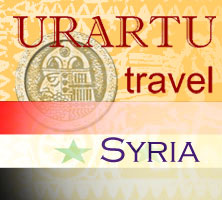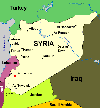About Syria
General Information -- Geography -- Climate -- Religion -- Language -- Population and Ethnic Composition-- Government -- Administrative Division -- Time Zone -- Currency Exchange and Credit Cards -- Capital City -- Holidays -- Airports and Public Transportation -- Traditional Cuisine -- Brief History
General Information
Syrians are among the most friendly and hospitable people in the world, and most visitors to their country end up developing a lifelong infatuation with its gentle charms.
The country has more than its fair share of significant historical sights, all of which are respectfully maintained by the authorities. The ancient cities of Damascus, Allepo and Basra are all listed on UNESCO’s World Heritage list, as is the sensationally beautiful ruined city of Palmyra. Mighty crusader castles, labyrinthine medieval souqs, jewel-like Damascus houses and sacred Umayyad mosques are only some of the treats on offer; there are plenty more for those who are keen to search them out. Best of all is the fact that these monuments are often woven into the fabric of daily life – the locals worship in the mosques, shop in the souqs, drink tea in the houses and picnic in the ruins. And they’re happy for travelers to join them.
Geography
Syria, officially the Syrian Arab Republic, is a country in the Middle East. It borders Lebanon to the west, Israel to the southwest, Jordan to the south, Iraq to the east, and Turkey to the north. Israel occupies the Golan Heights in the southwest of the country; a dispute with Turkey over the Hatay Province now seems to have subsided. Historically, Syria has often been taken to include the territories of Lebanon, Israel and the Palestinian Territories, and parts of Jordan, but excluding the Jazira region in the north-east of the modern Syrian state.
Climate
Syria has a Mediterranean climate with hot, dry summers (June to August) and mild, wet winters (December to February) close to the coast. On the coast, average daily temperatures range from 290C in summer to 100C in winter and the annual rainfall is about 760mm. On the cultivated steppe area, temperature average 350C in summer and 120C in winter. Rainfall varies from 250mm to 500mm. In the desert, the temperatures are high and rainfall low.
Spring is the best time to visit as temperatures are mild and the winter rains have cleared the haze that obscures views for much of the year. Autumn is the next best choice.
Religion
Islam is practiced by about 89% of the population – 20% of this is made up of minorities such as the Shiite, Druze and Alawite, while the remainder are Sunny Muslims. The business community is mainly drawn from Sunni Muslims.
Christians account for the remaining 11% of the population and belong to various churches, including Greek Orthodox, Greek Catholic, Syrian Orthodox, Armenian Orthodox, Maronite, Roman Catholic and Protestant.
Language
Arabic is the official language, spoken by 89% of the population, while 6% speak Kurdish, 3% Armenian and 2% other language. English and French are spoken in business circles.
Population and Ethnic Composition
Syria has a population of around 20 million, about 90% of which is Arab. The population includes some minorities such as the Bedouin (about 100,000) and smaller groupings of Armenians, Circassians and Turks. There are also about 1 million Kurds.
Government
The Syrian constitution vests the Arab Ba'ath Socialist Party with leadership functions in the state and society and provides broad powers to the president. The president, approved by referendum for a 7-year term, also is Secretary General of the Ba'ath Party and leader of the National Progressive Front. The president has the right to appoint ministers, to declare war and states of emergency, to issue laws (which, except in the case of emergency, require ratification by the People's Council), to declare amnesty, to amend the constitution, and to appoint civil servants and military personnel. Along with the National Progressive Front, the president decides issues of war and peace and approves the state's 5-year economic plans. The National Progressive Front also acts as a forum in which economic policies are debated and the country's political orientation is determined.
Administrative Division
Syria has fourteen governorates, or muhafazat. A governor, whose appointment is proposed by the minister of the interior, approved by the cabinet, and announced by executive decree, heads each governorate. The governor is assisted by an elected provincial council. Note that parts of the Quneitra governorate is under Israeli occupation since 1967 (see Golan Heights).
Time Zone
Syria’s Standard Time is 2 hours ahead Greenwich Mean Time (GMT+2). The Syrian Arab Republic operates Daylight Saving Time between 1 April and 1 October when time is 3 hours ahead of Greenwich Mean Time(GMT+3).
Currency Exchange and Credit Cards
The official currency is the Syrian pound (SYP), also called the lira. One pound is the smallest coin.
There is a growing number of ATMs in Syria, particularly in Damascus, some of which give advances on Visa and MasterCard. Major credit cards are increasingly being accepted by travel agencies, hotels and shops, but they are not accepted yet by most restaurants.
Capital City
The capital city of Syria is Damascus (population 4.5 million) One of the oldest continuously populated cities in the world, its position in verdant Gouta oasis and its proximity to the Silk Road led to its being coveted by waves of conquering empires. Egyptians, Assyrians, Persians, Greeks, Romans, Umayyads, Mongols, Turks and French were all lured by the city’s charms and felt their imprint on its physical form, making Damascus is one of the most architecturally significant cities in the Middle East. These days, the only foreign interlopers are travelers, who inevitably end up being seduced by its extraordinary Old City and unusual mixture of tradition and modernity.
Holidays
- 1 January - New Year's Day
- 8 March - Revolution Day
- 15 March - Al-Adha Day
- 21 March - Mother's Day
- March/April - Easter
- 6 April - Hijra New Year's Day
- 17 April - Independence Day
- 1 May - Labor Day
- 6 May - Martyr's Day
- 6 October - Liberation War of October Day
- 25 December - Christmas Day
Airports and Public Transportation
Damascus International Airport is 32 km southeast of Damascus. A Karnak airport bus service runs between the airport forecourt and the southwest corner of the Baramke garage. Departures are every half hour between 6am and midnight. A taxi into the city centre is organized at one of the desks in the arrivals hall. Car rental companies like Hertz and Eurocar have booths open from 8am to 10 pm.
Damascus is well served with a local bus and microbus network, but as the centre is so compact you’d rarely have to use it.
All the taxis are yellow and there are hundreds of them. A ride within the centre of town is quite inexpensive.
There are tow main bus stations in Damascus: Harasta garage, offering Pullman bus service to the north and international services to Turkey; and Baramke garage, which has services to the south, including to Jordan, Lebanon and the Gulf. In addition, there are several other minibus and microbus stations serving regional destination.
All trains depart from the Khaddam train station, about 5 km southwest of the centre. There are four daily services to Allepo.
Traditional Cuisine
The Syrian cuisine is varied and rich, in view of the fertility of Syrian lands and the abundance of their crops which enable the cook to be a master and to diversify in his choice and talent in the preparation of fresh meals made of vegetables, legumes and meats.
The Syrian table is always decorated with the various delicious pastries famous all over the world. Travelers do not miss to take with them on their leaving the country samples of these sweets to give them as presents to their dear friends and family members. These desserts are followed by fresh or dried fruits grown in Syrian fields.
Health concern is also cared for through the Syrian fresh and pure mineral waters gushing from mountains tops.
Brief History
Historically Syria included the territories that now make up modern Jordan, Israel and the Palestinian territories, Lebanon and Syria itself. Dew to its strategic position, its coastal towns were important Phoenician trading posts. Later the area became an equally pivotal part of the Egyptian, Persian and Roman Empires.
Syria finally ended up as part of the Ottoman domains ruled from the Istanbul, and was dished out to France (along with Lebanon) when the Ottoman Empire broke up after the WWI. France never had much luck with Syria-Lebanon mandate. Local opposition to its policy of carving up the country into mini states and minority enclaves led to revolts against French rule.
After the surrender of France to Germany in 1940, Syria came under the control of the Vichy government; its overthrow in 1941 paved the way for Syria’s independence to be formally recognized.
A nationalist government was formed under Shukri al-Kuwatli in August 1943, but the French continued to be in denial about the waning of its influence in the region, bombing Damascus after locals had demonstrated in support of the final handover of administrative and military services to the new government.
The situation was only resolved after the British intervened and oversaw the final departure of all French troops and administrators at the end of the war. A period of political instability followed and by 1954, after several military coups, the nationalist Ba’ath party took power virtually unopposed. A brief flirtation with the Pan-Arabist idea of a United Arab Republic (with Egypt) in 1958 proved unpopular and coups in 1960, 61 and 63 saw the leadership change hands yet again.
By 1966 the Ba’ath party was back on power, but it was severely weakened by losses in two conflicts – the Six-Day War with Israel in 1967 and the Black September hostilities in Jordan in 1970. At this point Defense Minister Hafez al-Assad ceased power. Assad maintained control longer than any other postindependence Syrian government. In 1998, he was elected to a fifth seven-year term with the predictable 99,9% of the vote. It took a failing of health to finally remove the man from power; his death was announced on 10 June 2000.
Following the death of Assad senior, his son Bassar acceded to power. A new government was formed in December 2001 with a mandate to push forward political, economic and social reforms. This has proved a challenge, particularly when it comes to reforming the country’s unwieldy bureaucracy, many members of which have been recruited due to their political contacts rather than their level of competence. As a result, change isn’t occurring as swiftly as many observers had hoped.
Improving the country’s relations with the international community is proving even trickier. Publicly branded a ‘rogue state’ by the US President, Syria has recently been forced to withdraw its army and intelligence personnel from Lebanon. It has also been criticized by the US for its support of Hezbollah and for allegedly turning a blind eye to the movements of Iraqi insurgents. Though making a gallant effort to stand firm in the face of the superpower’s displeasure, Syria is looking increasingly isolated on the world’s political stage.



